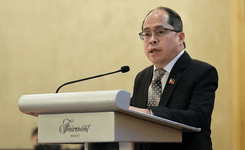PEZA eyes $100-B investments, vows improved logistics
The Philippine Economic Zone Authority (PEZA) said it is eyeing $100 billion in investment deals from the US and Japan involving electronics, renewable energy, agriculture, logistics and port infrastructure development projects as it vowed to implement initiatives to address logistics issues and to further improve the country’s ease of doing business.

PEZA Director-General Tereso O. Panga revealed in an update on the country’s logistics and infrastructure projects and PEZA’s plans and programs at the Future of Logistics 2024 forum organized by the American Chamber of Commerce of the Philippines, Inc. (AmCham) in partnership with Santos Knight Frank and Aboitiz InfraCapital, last May 29.
According to Panga, PEZA is now eyeing about $100-billion prospects for investment deals from the US and Japan into EMS-SMS, manufacturing and supply chains, clean energy, agri-business, rail, and port infrastructure development.
“We also see our investors taking advantage of the upcoming Luzon economic corridor which will support connectivity among Subic Bay, Clark, Manila, and Batangas as well as facilitate strategic, anchor investments within each hub in high-impact infrastructure projects among others,” said Panga.
Apart from the strengthened efforts on investment attraction including the conduct of missions to the US and other countries, the Philippines is currently presented with rare opportunities that it can leverage to make itself a prime investment destination in the region. This includes the China+1 strategy, the US CHIPS Act, and the US-Japan-Philippines trilateral agreement, among others.
Moreover, the PEZA Chief highlighted the Philippines’ consistent high GDP growth among ASEAN makes us one of the best-performing economies in the region.
He noted of the country’s robust GDP growth for the past couple of years. In fact, he said that PEZA has increased its annual ecozone investments since 2022, achieving a six-year high in 2023 to P175.7 billion.
“We cannot pass up on the current developments and opportunities in ally-shoring as the Philippines is still in the sweet spot for attracting investments into the country,” expressed Panga as PEZA remains bullish in increasing its more than 300 companies with American equity in the Philippines and bring in more investments in the country and jobs for the Filipino people.
Panelists during the forum, however, also raised areas that need improvement, especially on the country’s logistics and ease of doing business.
The Semiconductor and Electronics Industries in the Philippines Foundation, Inc – Association of Logistics Managers (SEIPI-ALM) Chairperson Wilda Calderon, said the country needs to make improvements to the challenges at hand which prove to be barriers to doing business. She emphasized that the implementation of ease of doing business, especially in the government, is really a must.
Quantity Solutions President and CEO Engr. Rynor Jamandre also emphasized the need to address “fragmented government policies” as it is necessary to solve the challenges.
In response, Panga said that PEZA is implementing several “leap-frogging” strategies to address the challenges in the supply chain, industrial, and logistics sectors and in the process attract more industrial investments, particularly in the ecozones.
These strategies include the automation of systems and processes to provide excellent service to our clients with our unique brand of service; the creation of an off-dock container yard in our zones for a more effective container exchange proposed ecozone CFS, and the creation of a logistics park under PEZA’s new frontiers in ecozone development; multi-industry infrastructure convergence where PEZA and the government are committed to providing for all infrastructure needs of our locators; strengthened partnership with the Bureau of Customs to ensure unhampered operations to and from the zones; and continuous engagement with lawmakers for the possible amendments on investment laws and other economic provisions as well as in updating archaic laws such as the parameters for regulated commodities that are not aligned with international standards.
“We are committed to doing these strategies from within our own domain and sphere of influence, and we will continue to strengthen our partnership with other government agencies and industry partners like AmCham to address these challenges. In doing so, the Philippines can be the gateway to the Asia Pacific!” said Panga.
On the ease of doing business, Procurement and Supply Institute of Asia Global Chairman Charlie Villasenor raised the need for a consolidated effort to address the pain points for investments.
SEIPI ALM Chairperson Wilda Calderon shared that SEIPI is now seeing an increasing trend for the EM-SMS industry despite the initial flat growth target. As such, they need support from the government to make this possible. “We have lots of support systems that we would like to optimize the benefits of working with them,” she stated.
Meanwhile, Jamandre, who is also AmCham’s Infrastructure and Logistics Committee Chairperson, cited PEZA’s brand of service to be replicated among agencies to provide ease of doing business, especially for investors.
“I believe that the bigger PEZA is actually the better Philippines… PEZA should be the role model for every agency,” expressed Jamandre.
Committed to providing the best ecosystem for investors, DG Panga emphasized the need to implement not only a whole-of-government approach but a whole-of-industry approach to amplify the business and investment experience in the Philippines, especially through the ecozones.
“We cannot do this alone, but with all of us working together, we can make the Philippines an attractive destination in the region,” noted Panga.